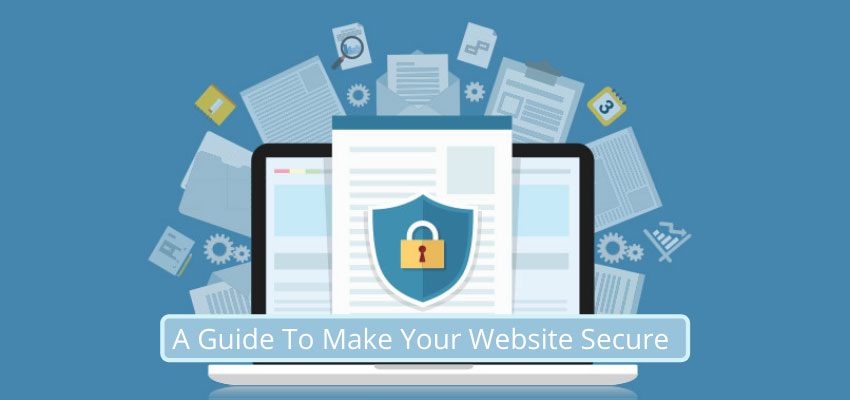You must secure your website, which entails putting safeguards to keep hackers, bugs, and other online nasties out. Otherwise, your information could be stolen, your website could crash, and you could lose money. Hacking can result in significant traffic losses, the suspension or crash of your website, and even identity theft, in addition to financial loss. It's possible that your personal information, as well as that of your visitors, will be compromised.
Here's how to secure a website:
1. SSL should be installed
You Can Also Read: Web Design Strategies To Attract More Leads
Installing an SSL (Secure Sockets Layer) certificate is one of the simplest ways to protect your website, yourself, and users. You may not realize it, but you come across SSL regularly while surfing the web. An SSL certificate is installed on your website and encrypts data sent between your site and your visitors. SSL encrypts data sent back and forth between your website and its visitors. Google now warns visitors when they visit a site that doesn't use SSL, and it even penalizes those sites in its search results.
If you're accepting payments, requesting login information, or transferring files, SSL security is particularly important. The data is unprotected and vulnerable to hackers without it. If you run an ecommerce store or collect visitor information such as emails on your website, you'll need an SSL certificate. SSL certificates not only help with SEO, but they also prove that any data your visitors send to your site is sent over an encrypted channel, which means hackers can't see it while it's in transit.
You don't need to understand the technical details of SSL security, so don't be concerned if you don't. The most important thing is to know why your site requires SSL and how to obtain it.
2. Anti-Malware Software should be used
Anti-malware software may appear to be a lot of jargon, but the good news is that it does the hard work for you, so you don't have to worry about the technical details. Your site's security should be taken care of by a good website builder or hosting provider. Anti-malware software is frequently included in hosting plans, and some even include paid services like Site Lock for free.
Your website's backbone is made up of web hosts. They assist you in getting online and frequently provide additional tools for your website, allowing you to create a website that has the look and feel you desire.
Quality website hosting providers offer automatic security patches and updates to protect WordPress and other content management systems they host. It is the hosting company's responsibility to maintain its servers and implement necessary security monitoring.
3. Make Your Passwords Impossible to Crack
We forget how important they are because we are so used to seeing them. It's easy to forget your password but understands it is between a hacker and your personal information. Passwords are not only a critical step, but they're also one of the simplest things you can do to improve the security of your website.
4. Ensure that your website is updated
We're not talking about keeping your visitors up to date on the latest gossip or promoting your newest product. It is about the significance of maintaining the software on your website up to date. You won't have to worry about this if you use a website builder because most of them will care about software updates and security issues for you. However, if you're using a platform like WordPress, you'll need to stay on top of things and run updates as required. You must update both the WordPress core software and any plugins you have installed. If you don't, it'll become outdated and vulnerable to bugs, glitches, and, worst of all, malicious code from hackers.
5. Run Backups regularly
Following each of the steps we've outlined so far will assist you in thwarting hackers. Don't take your site's security for granted; making regular backups of your site is a good idea. Making backups of your website ensures that if the worst happens, you'll still have a current version of your site safe and sound, ready to relaunch.
A backup is a copy of your website's data, including files, content, media, and databases. If your website is large or complex, you'll need more backup storage to keep all of your data safe. If your company's website is hacked, you'll need a way to get back up and run quickly to avoid losing customers.
If something goes wrong, you can quickly restore the most recent uncorrupted version of your site. Make sure that whichever service you choose performs daily backups so that you don't have to fix an out-of-date site in the event of a crash.
Wrapping up!
Scams are becoming increasingly sophisticated, even though they appear to be simple. Fortunately, securing your website does not necessitate worrisome technical knowledge. Here are five things you can do to prevent unwelcome visitors from entering your website:
- If you're working in a shared space like a cafe, be wary of public or open internet connections; they won't be secure.
- Never click on links in suspicious emails; instead, delete the email immediately. If you're using a professional email address linked to your website rather than a personal one, this is still important.
- Check that the people you give access to your website are people you can trust and that they are security-conscious.
- As soon as you set up your account, change the default settings, passwords, and usernames – this is especially important for WordPress sites.
- To gain access to your site, only trusted professionals should do so.
Author Bio:
Abhishek Trivedi is a Marketer by Nature, and Digitally Skilled makes him a Digital Marketer. He is a Content Writer, Strategic Planner, Project Manager, Part artist, and Leader. He is the Founder of Digital Sky 360, which is a top Digital Marketing and website design company in Ahmedabad.
